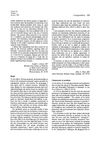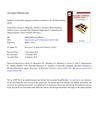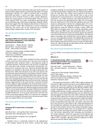 1 citations,
August 2018 in “bioRxiv (Cold Spring Harbor Laboratory)”
1 citations,
August 2018 in “bioRxiv (Cold Spring Harbor Laboratory)” A new mutation in the TMEM173 gene and a risk allele in IFIH1 cause a unique set of immune-related symptoms.
April 2023 in “Journal of Investigative Dermatology” Increased TEMRA cells can predict treatment outcomes in rapidly progressive alopecia areata.
 April 2020 in “Research Square (Research Square)”
April 2020 in “Research Square (Research Square)” Women with PCOS may have a reduced ability to fight breast tumor cells over time.
April 2018 in “Journal of Investigative Dermatology” Melanogenesis-related proteins may trigger immune responses in alopecia areata patients.
 April 2007 in “Nature Clinical Practice Urology”
April 2007 in “Nature Clinical Practice Urology” TICE salvage chemotherapy is effective for treating germ-cell tumors with poor prognosis.
 January 1989 in “Journal of The American Academy of Dermatology”
January 1989 in “Journal of The American Academy of Dermatology” Psoriasis patients have immune cells that respond more strongly to signals and stimuli due to an intrinsic cellular defect.
October 2022 in “Academic journal of science and technology” Stem cells, especially from fat, show promise for treating hair loss.
12 citations,
April 2017 in “Experimental and Therapeutic Medicine” Patients with severe active alopecia areata have lower CD200 expression and an imbalance in their immune system.
 3 citations,
February 2011 in “Journal of Biomedical Research/Journal of biomedical research”
3 citations,
February 2011 in “Journal of Biomedical Research/Journal of biomedical research” A new mutation in the KRT86 gene was found to cause the hair disorder monilethrix in a Han family.
 April 2023 in “The journal of investigative dermatology/Journal of investigative dermatology”
April 2023 in “The journal of investigative dermatology/Journal of investigative dermatology” People with alopecia areata have fewer IL-10 producing immune cells, which might contribute to the condition.
 April 2022 in “Indian Journal of Forensic Medicine & Toxicology”
April 2022 in “Indian Journal of Forensic Medicine & Toxicology” PSA can help diagnose high androgen levels in women.
 November 2013 in “Faculty Opinions – Post-Publication Peer Review of the Biomedical Literature”
November 2013 in “Faculty Opinions – Post-Publication Peer Review of the Biomedical Literature” Injecting CD34+ cell-containing platelet-rich plasma can improve pattern hair loss more than placental extract treatment.
253 citations,
December 2007 in “Journal of Investigative Dermatology” Hair follicles prevent NK cell attacks to avoid hair loss.
 6 citations,
January 2016 in “Bioorganic & Medicinal Chemistry Letters”
6 citations,
January 2016 in “Bioorganic & Medicinal Chemistry Letters” Some minoxidil combinations can help differentiate leukemia cells without harming other cells.
4 citations,
September 2011 in “Journal of the American Academy of Dermatology” A man developed a skin cancer called folliculotropic mycosis fungoides after a kidney transplant.
 June 2022 in “Frontiers in Immunology”
June 2022 in “Frontiers in Immunology” Tofacitinib regrew hair in a man with total hair loss but raised cytokine levels, needing more research on possible side effects.

Using a combination of AMD3100 and FK506 can speed up and improve wound healing in diabetic rats.
 September 2016 in “Journal of Dermatological Science”
September 2016 in “Journal of Dermatological Science” A specific mutation known for causing cancer is also found to cause a skin condition in a young girl.
 August 2001 in “Veterinary Dermatology”
August 2001 in “Veterinary Dermatology” The meeting presented findings on effective treatments for various pet skin conditions and insights into the immune responses of dogs with atopic dermatitis.
 27 citations,
April 2018 in “Journal of autoimmunity”
27 citations,
April 2018 in “Journal of autoimmunity” iNKT cells can help prevent and treat alopecia areata by promoting hair regrowth.
15 citations,
December 2018 in “International journal of environmental research and public health/International journal of environmental research and public health” EGCG may help treat alopecia areata by blocking certain immune responses and reducing specific harmful immune cells.
April 2019 in “Journal of Investigative Dermatology” The humanized AA mouse model is better for testing new alopecia areata treatments.
 April 2017 in “Journal of Investigative Dermatology”
April 2017 in “Journal of Investigative Dermatology” SM04755 may be an effective topical treatment for psoriasis.
 57 citations,
May 1986 in “Clinics in endocrinology and metabolism”
57 citations,
May 1986 in “Clinics in endocrinology and metabolism” Androstanediol glucuronide is a reliable marker for hirsutism in women.
 2 citations,
May 2019 in “Advances in wound care”
2 citations,
May 2019 in “Advances in wound care” Blood-derived CD34+ cells speed up healing, reduce scarring, and regrow hair in skin wounds.
 49 citations,
April 2016 in “International journal of molecular sciences”
49 citations,
April 2016 in “International journal of molecular sciences” Shift nurses show altered body temperature and stress hormone levels, suggesting their body clocks adjust to irregular schedules.
 137 citations,
April 2015 in “Nature Reviews Molecular Cell Biology”
137 citations,
April 2015 in “Nature Reviews Molecular Cell Biology” Different types of stem cells with unique roles exist in blood, skin, and intestines, and this variety is important for tissue repair.
 5 citations,
July 2017 in “Women & Health”
5 citations,
July 2017 in “Women & Health” Nursing women in the West Bank with higher income and non-smoking habits have higher blood zinc levels.
 506 citations,
January 2012 in “Molecular and Cellular Endocrinology”
506 citations,
January 2012 in “Molecular and Cellular Endocrinology” Melatonin affects many body functions beyond sleep by interacting with specific receptors in various tissues.
 15 citations,
December 2013
15 citations,
December 2013 Men with more vanadium in their blood and who drink less soy milk are more likely to have hair loss.






















